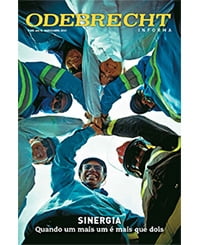Edition 165 – Focus on the economy and culture
Agro-ecotourism is a growing business in the Southern Bahia Lowlands
1 de April de 2013
Agro-ecotourism is a growing business in the Southern Bahia Lowlands
1 de April de 2013

written by Gabriela Vasconcellos
photos by Élcio Carriço
Where there is effective synergy, according to the Odebrecht Entrepreneurial Technology (TEO), people’s simultaneous and harmonious actions will lead to greater results. This unified effort involves the power of cooperation, appreciation of differences and the ability to contextualize, unify and catalyze to maximize collective potential.

This is the essence of Program for the Development and Growth Integrated with Sustainability of the Mosaic of Southern Bahia Lowlands Environmental Protection Areas (PDCIS). The challenge of taking a rural area with a rich environmental heritage and making it dynamic and prosperous, keeping young talent in the countryside, has united the government, private sector, civil society and the Odebrecht Foundation, which together form an innovative system called Participatory Governance.
The Brazilian Government has adopted the synergistic work of these different actors through three government ministries, and the program’s experience is now viewed as being in the national interest. At the invitation of the Environment Ministry (MMA), the PDCIS was introduced at the UN Conference on Sustainable Development (Rio+20) in 2012. That presentation, also backed by the Ministry of Foreign Affairs, was part of the MMA Biodiversity and Forest Department’s program at the conference.
PDCIS’s interaction with the Tourism Ministry (MTur) has resulted in a BRL 36-million investment in the Southern Bahia Lowlands region. “I believe in the success of the PDCIS and the expansion of a growing segment: agro-ecotourism. In that region, the goal is to develop this opportunity from the cultural and economic standpoint to stimulate local development,” observes the MTur’s National Secretary for Tourism Development Programs, Fábio Mota.
Quilombola community
Divided into eight tranches, the funding will be used to rehabilitate a 37-km stretch of the BA-250/Pratigi highway. This stretch connects state highway BA-001 to Pratigi Beach, in Ituberá county, and also provides a link to Citizenship Park Highway (basic infrastructure for communication and the generation of wealth that will help consolidate agro-ecotourism).
“This investment is hugely important because it adds value to Bahia as a destination,” says Fábio Mota. The government of that state is the intermediary between the Ministry of Tourism and the Land Conservation Organization (OCT), a civil society organization of public interest (OSCIP) that is part of the environmental arm of the PDCIS which is responsible for implementing the project.
The road gives access to more than the beach. Halfway there, we come across a quilombola (maroon) community called Jatimane. Located in Nilo Peçanha county, it has grown in the shade of the piassava palms. The river that runs through it bears its name. The main economic activities of the 90 families who live there are based on growing piassava palms and fishing.
In recent years, residents have identified tourism as an alternative source of income. “We accompany tourists who visit the community and offer them products like handicrafts and bio-jewelry made from piassava fiber. Restaurants serve local cuisine,” says Eduardo do Rosário, 39, the president of the Jatimane Community Association. He believes the refurbished route will bring in more tourists. “The result will be the development of our community.”
Knowledge and experience
The joint actions of the Odebrecht Foundation and its partners to make the PDCIS a reality are serving as an inspiration for the entire Odebrecht Group. “This spirit and part of the program’s methodology in the Southern Bahia Lowlands are present in the main social initiatives deployed by our Engineering & Construction business, such as the IIRSA South Highway in Peru, and the Kulonga Pala Kukula social outreach program in Angola. It also guides projects like the Remigio Rojas irrigation venture in Panama and El Palmar-Diluvio in Venezuela,” says Renato Baiardi, a member of the Foundation’s Board of Trustees and the Board of Directors of Odebrecht S.A., who adds: “The Foundation’s work in the Southern Lowlands is iconic for the entire organization, because it is a source of knowledge and experience.”
Do you wish to be
a partner in our projects, make
a donation or hire our technical consulting?
Send a message
right now!